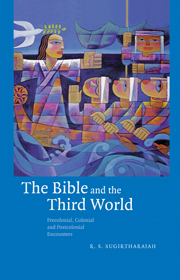Book contents
- Frontmatter
- Contents
- Acknowledgements
- 1 Introduction
- PART I PRECOLONIAL RECEPTION
- PART II COLONIAL EMBRACE
- PART III POSTCOLONIAL RECLAMATIONS
- 6 Desperately seeking the indigene: nativism and vernacular hermeneutics
- 7 Engaging liberation: texts as a vehicle of emancipation
- 8 Postcolonializing biblical interpretation
- Afterword
- Select bibliography
- Index of biblical references
- Index of names and subjects
7 - Engaging liberation: texts as a vehicle of emancipation
Published online by Cambridge University Press: 02 December 2009
- Frontmatter
- Contents
- Acknowledgements
- 1 Introduction
- PART I PRECOLONIAL RECEPTION
- PART II COLONIAL EMBRACE
- PART III POSTCOLONIAL RECLAMATIONS
- 6 Desperately seeking the indigene: nativism and vernacular hermeneutics
- 7 Engaging liberation: texts as a vehicle of emancipation
- 8 Postcolonializing biblical interpretation
- Afterword
- Select bibliography
- Index of biblical references
- Index of names and subjects
Summary
I don't particularly think liberation should need theology.
Gayatri Chakravorty SpivakIn the 1980s, after nearly twenty years of liberation theology, Juan Luis Segundo, one of its pioneers, delivered a lecture in Toronto, and in it he delineated the shifts within Latin American liberation theology. In the course of the lecture Segundo identified two types of Latin American theology: one initiated by middle-class professional theologians, and the other by ordinary people. The features of the first line of theology were the conversion of the professional class of theologians to the cause of the poor; their detection of the ideological manipulation of the gospel by the institutions and the powerful, to maintain their hold; and their commitment to provide longterm pastoral care with a new de-ideologized and humanizing gospel recoverable from the ancient texts. Segundo told his audience: ‘Thus it was not the oppressed people, but the middle classes, beginning with students, who received the first features of this liberation theology as a joyful conversion and a new commitment.’ The context for the first model was the university, and its proponents were a theologically trained cadre. The middle class acquired a new theological vision and made liberation their new commitment at the cost of risking their physical comforts and material privileges.
The second model of Latin American theologizing, Segundo observed, arose as a result of the irruption of the populist movements with their indigenous religiosity.
- Type
- Chapter
- Information
- The Bible and the Third WorldPrecolonial, Colonial and Postcolonial Encounters, pp. 203 - 243Publisher: Cambridge University PressPrint publication year: 2001

